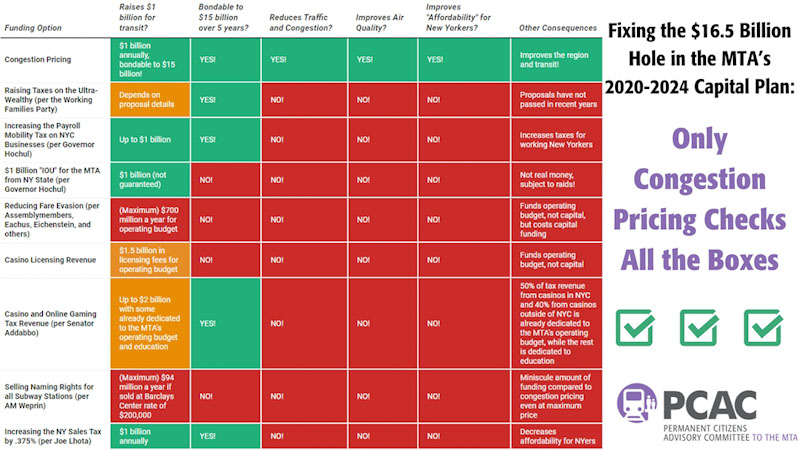MTA Advisory Committee Slams Congestion Pricing Alternatives
NEW YORK—The Permanent Citizen’s Advisory Committee to the MTA released a new report earlier this month entitled “Funding the MTA’s 2020-2024 Capital Plan: Evaluating Proposed Alternatives to Congestion Pricing.” The panel examined how Congestion Pricing compares to eight of the more noteworthy alternative schemes. All proposals failed to tackle the issues of traffic reduction and steps to improve air quality, the report noted.
Traffic congestion has been estimated to cost the New York City region $20 billion in lost economic activity. In contrast to the economic damage congestion causes, public health also improves when there’s less traffic. Cities that have implemented congestion pricing plans report lower asthma hospitalization rates, decreases in air-pollution-related health outcomes and road-traffic injuries.

Four of the eight proposals are bondable, it was noted, but all would be better utilized to fund the 2025-2029 MTA capital plan. This is essential as the $1 billion in revenue is expected to bond up to $15 billion toward the current capital plan. For a funding stream to be bondable, it is necessary for it to be continuous and predictable, not a onetime infusion of cash, the report stated.
The report comes on the heels of subway delays that are an early indicator of issues that will become endemic if the 100-year-old switches and signals aren’t replaced, and substations upgraded. Recent significant weather events have also highlighted the system’s vulnerabilities.
For her part, Gov. Kathy Hochul said recently she was “massaging” plans to close the funding gap, although details remain unclear at press time. Many elected officials and groups have floated far-flung funding concepts to replace the $16.5-billion-hole that Gov. Kathy Hochul created in the MTA’s current Capital Program on June 5, following her 11th-hour pause of the congestion pricing toll program that was scheduled to begin on June 30.
“The unexpected pause of Congestion Pricing is already having immediate and dramatic impacts on the transit system, the millions of daily transit riders in New York who rely on it, and hundreds of thousands of New Yorkers across the state who rely on the MTA for their paychecks,” said Lisa Daglian, executive director of PCAC. “Promises made, promises broken, and we’re just seeing the tip of the iceberg of the true cost of the governor’s pause, which will affect New Yorkers of every income level, but lower income workers the most.”
She continued, “At the same time, we’re seeing air quality alerts almost daily, and traffic levels even higher than they were pre-pandemic—while traffic speeds are slower than ever. It’s high time for Gov. Hochul to obey the law, and ‘unpause’ the pause to let Congestion Pricing move forward. The economic viability of our entire region depends on it.”
